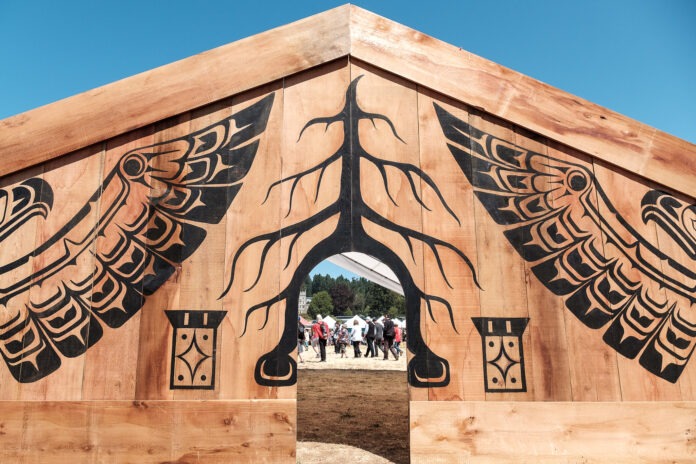Canada Day this year comes amid a surge in national pride among Canadians.
The pushback against U.S.-imposed tariffs and the Trump administration’s rhetoric about making Canada the “51st state” is lending a renewed sense of “elbows up” patriotism to this year’s celebrations.
But First Nations leaders in British Columbia say Canada Day should also be an opportunity to reflect on Canada’s colonial history – especially during what many say has been a backsliding in reconciliation efforts in B.C. and across the country.
B.C.’s NDP government pushed through a pair of controversial bills at the end of spring parliamentary session that aim to fast-track certain infrastructure and renewable energy projects. Bills 14 and 15 faced fierce opposition from several First Nations leaders, who said the bills violated their right to consultation under B.C.’s Declaration on the Rights of Indigenous People’s Act (DRIPA) and represented a significant step backward in reconciliation efforts.
The federal government’s Bill C-5, passed last week, has faced similar opposition. The bill allows the government to fast-track projects deemed to be in the “national interest,” including by pushing them through a shortened review process.
Assembly of First Nations members have voiced concerns about the bill’s ability to override the Indian Act and key environmental legislation.
Robert Phillips with the First Nations Summit Political Executive said Canada Day has always brought mixed feelings for many Indigenous people due to the effects of colonization and the residential school system. He noted while Canada marks its 158th birthday, it was only in 1960 that Indigenous people were granted the right to vote without losing their treaty status.
Phillips said there were signs of progress over the past few years, with the implementation of DRIPA in B.C. and other policies that created a framework for future negotiations between First Nations and governments.
“There was a little shining hope that this would continue,” said Phillips.
But he says First Nations right now are disappointed and frustrated.
“[First Nations] want to be part of the social-economic fabric of Canada, but just seem excluded,” said Phillips.
B.C.’s Infrastructure Minister Bowinn Ma acknowledged prior to the passage of Bills 14 and 15 that consultations with First Nations on the legislation were not sufficient, and pledged that more in-depth engagement would take place around regulations created under the legislation.
Prime Minister Mark Carney has also said he would hold a series of national summits this summer with First Nations, Métis, and Inuit rights holders to address concerns around Bill C-5 – though APTN reported last week that Indigenous organizations didn’t receive any formal invitation ahead of Carney’s announcement.
“I think many First Nations are really thinking about what this relationship [with Canada] means,” said B.C. AFN Regional Chief Terry Teegee.
He said the fast-tracking legislation has been part of a “knee jerk” reaction to U.S. President Donald Trump’s contentious foreign policy. But Teegee adds, while the Trump administration is set to end after his four-year term, the projects introduced under the legislation will impact First Nations and other communities for decades to come.
Teegee said despite the current strained relationship between government and First Nations, he has hope that progress can continue to be made on reconciliation.
“Canada Day is a time to celebrate the dream of what Canada could be,” he said “A dream that reflects the people who were here even before Canada was a country, and celebrates the diversity of this whole country.”
For Gena Edwards with B.C. Native Women’s Association, July 1st is not a day to celebrate.
“We’re here to remind governments and the public that reconciliation is meaningless without action to protect Indigenous women, girls and families,” said Edwards.
She notes violence against Indigenous women and girls remains high, and the calls to justice from the inquiry into MMIWG have not been fully implemented.
“Safety and human rights must come before symbolic gestures,” said Edwards.
The final report from the National Inquiry into Missing and Murdered Indigenous Women and Girls was published in 2019 with 231 Calls for Justice. As of this year, just two of those recommendations have been fully implemented, though the government notes work is underway on 113 of them.
A 2023 Statistics Canada report said out of all gender-related homicides of women and girls between 2011 and 2021, 21 per cent of victims were Indigenous, despite making up just five per cent of the female population in Canada in 2021.
Edwards said she wants people to remember this Canada Day that Indigenous people still experience the harms of colonialism today.
“Canada Day is a reminder to create a safe future for all children and families, including non-Indigenous people, because together we are better,” she said.



